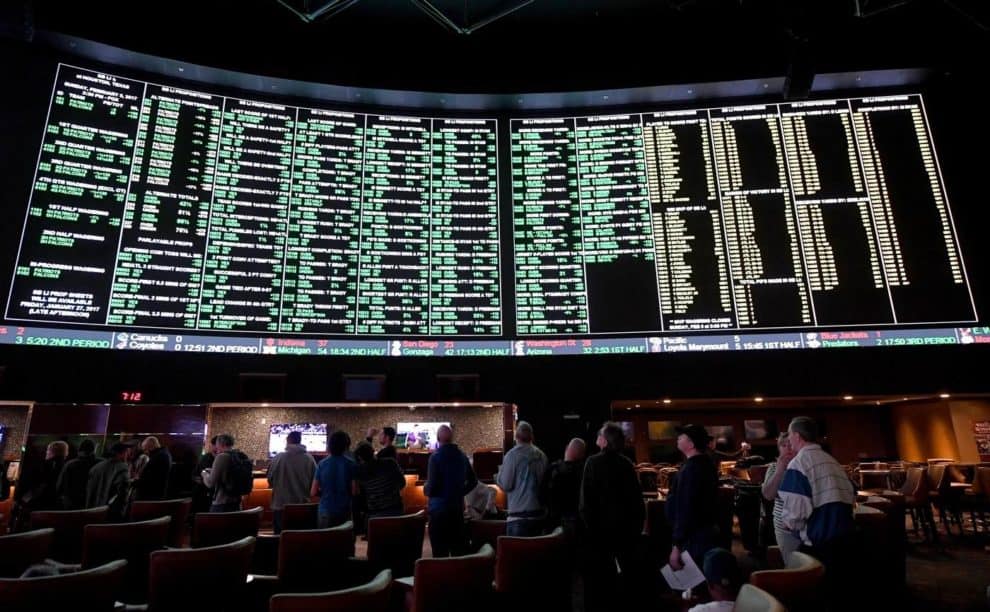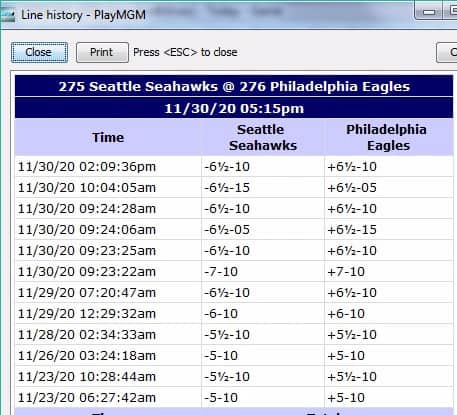
- The Seattle Seahawks controlled Monday’s game against the Philadelphia Eagles throughout but lost the pointspread cover on a meaningless late touchdown.
- The loss is no doubt a hard lesson for at least two players who bet six figures on Seattle -6.5 over Philadelphia.
- It is inexplicable for someone to bet six figures on a bad line when they could have easily found a more advantageous price earlier in the betting cycle.
The public was all over Seattle over Philadelphia in Monday’s NFL action and those that didn’t understand the value of finding a good price are now moaning about a ‘bad beat’.
Here’s how it transpired: Seattle took unbalanced action on the game resulting in a closing line of -6.5 at most books. The Seahawks controlled the game throughout and led 23-9 with 1:13 remaining after a 39 yard field goal by Jason Myers. Everything looked good for Seattle backers until the Eagles went 58 yards over 4 plays in just over a minute to score a touchdown on a 33 yard pass from Carson Wentz to Richard Rodgers. This made the score 23-15 and the Seahawks backers quickly realized that there was only one way to lose. If Jake Elliott comes out to kick a PAT the final score ends up 23-16 giving Seattle the cover by 1/2 point. Instead, the Eagles went for the two point conversion–presumably because Elliott had missed his previous PAT attempt. Miles Sanders ran it in for a successful two point conversion and the Seahawks won by a six point margin.
A number of mainstream sports websites are already reporting on the ‘bad beat’ on Monday Night Football. Instead, they should use this ‘teachable moment’ to reinforce the critical importance of betting good lines.
So let’s see where it went off the rails for Seattle backers. In today’s Las Vegas Review-Journal sports betting reporter Todd Dewey wrote about the wagering action on the game. He spoke to MGM Resorts director of trading Jeff Stoneback who underscored the flood of public money backing Seattle:
“I knew it would be an onslaught of one-way action,” he said. “I was afraid of that.”
The ticket count is 6-1 in favor of the Seahawks at BetMGM. The money ratio is 14-1 for Seattle.
The story was the same elsewhere in town with Circa Sports sportsbook manager Chris Bennett saying simply:
“Nobody is interested in the Eagles.”
There was plenty of liability on Seattle teasers and moneyline parlays giving the public even more of a stake on the Seahawks. William Hill sportsbook director Nick Bogdanovich explained the situation:
“There’s quite a bit of carryover to Seattle. Yesterday was good, but the Sunday night game came Green Bay and over. There are a lot of Packers and overs going to Seattle and over. There’s a bunch of Seattle teasers and money-line parlays out there.”
“We certainly don’t need Seattle and over.”
Sunset Station sportsbook director Chuck Esposito made the distinction between ‘respected play’ and the public position:
“It’s one of those games where the public is on the Seahawks, but the respected play has been on the Eagles. We’re clearly going to be Eagles fans.”
The Don Best percentages showed 65% of side bets on the Seahawks with 57% of totals bets on the ‘OVER’.
BETTING BIG DOES NOT NECESSARILY INDICATE ‘SMART MONEY’
There’s something of a misconception among some neophyte sports bettors that betting big automatically confers ‘sharp’ status. Nothing could be further from the truth. Let’s go back to Todd Dewey’s story in the Las Vegas Review-Journal and consider two big wagers from BetMGM:
Imagine placing a half-a-million dollar bet on your phone.
That’s what a gambler in Nevada did on their BetMGM sportsbook mobile app Sunday night. The bettor made a $500,000 straight wager to win $454,545 on the Seahawks -6½ over the Eagles on “Monday Night Football.”
Another BetMGM bettor made a $189,190 wager to win $171,991 on Seattle -6½ on Monday.
What’s inexplicable about these bets is that in both cases these big bettors bit on either the worst available line or close to it when better lines had been available for more than a week. Here’s the line history from PlayMGM:

Had these big bettors gotten down at any point prior to early Sunday morning they would have had no worse than a ‘push’. Even if they thought it was the strongest play they had ever seen in a sporting event they still needed to give themselves every edge possible and get down at a good price. Instead they took a bad line and it cost them. A couple more quotes from the Las Vegas bookmakers provide some insight into how a ‘sharp’ would play this. We’ll start with the MGM’s Jeff Stoneback:
“We did get a little nibble of sharp money at +6½, with a $500 bet on the Eagles.”
Circa Sports sportsbook manager Chris Bennett said the book took a sharp bet on Seattle -5½.
Notice that the MGM’s Stoneback had more respect for the $500 bet at a good price than he did the six figure bets at bad prices? His job would be easy if he could take half million dollar bets at bad numbers every day.
FOR LONGTERM SUCCESS IN SPORTS BETTING YOU HAVE TO ROUTINELY BEAT THE GAME *AND* BEAT THE NUMBER
An essential concept to learn if you want to be a serious sports bettor: you not only have to ‘beat the game’ but you also have to ‘beat the number’. No matter how much you liked Seattle in this spot it didn’t justify betting them at a bad price. It especially doesn’t justify betting a half a million dollars on the Seahawks at a bad price.
Taking the Seahawks at -6.5 or -7 is the wrong theoretical move for another reason–you’ve got the ‘key number’ of 6 working against you. For a sharp player, a play on Seattle would have been tough at -6 for this reason alone. At -6.5 or -7, most sharps would be looking at taking the underdog plus the points simply because it would put the ‘key number’ in your favor. To paraphrase the great Steve Fezzik: “Squares bet teams, sharps bet prices”.
Finally, if you want to be a successful sports bettor you’ll need to get comfortable with being a ‘contrarian’. If the ‘public’ is unloading on one side, you can do much worse than simply looking in the opposite direction. The ‘public’ isn’t always wrong but bookmakers are well aware of teams with strong public backing and ‘shade’ the lines in order to make bettors pay a ‘premium’ for betting popular teams. The flip side is also true–a sharp player’s ears would have perked up hearing Circa’s Chris Andrews say that ‘nobody is interested in the Eagles’. Translated–since the public is paying a ‘premium’ in the form of a shaded line to bet Seattle by definition it means that you can get additional line value simply by betting the unpopular side, in this case the Eagles.
Successfully betting on sports in the long term is exceedingly difficult. Knowing the ins and outs of sports is not enough. You have to understand the ins and outs of *betting*. In fact, you’re much better off focusing on the ‘betting’ component and not the ‘sports’ component. Understanding point spreads, how they’re made, what they mean and why they move is a great place to start.









